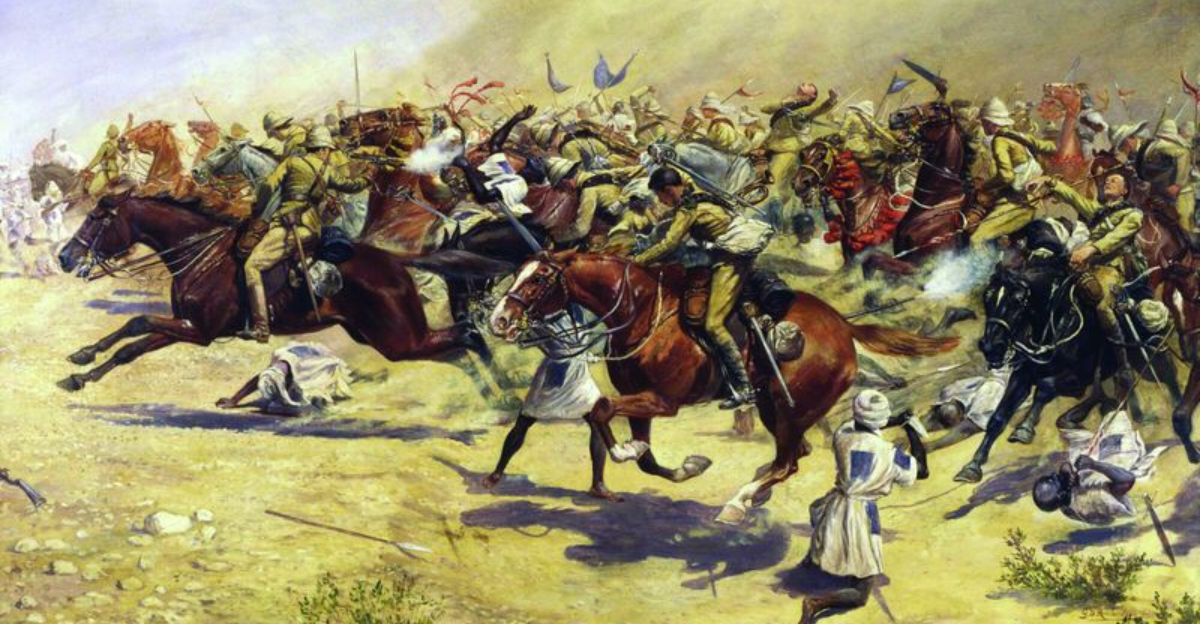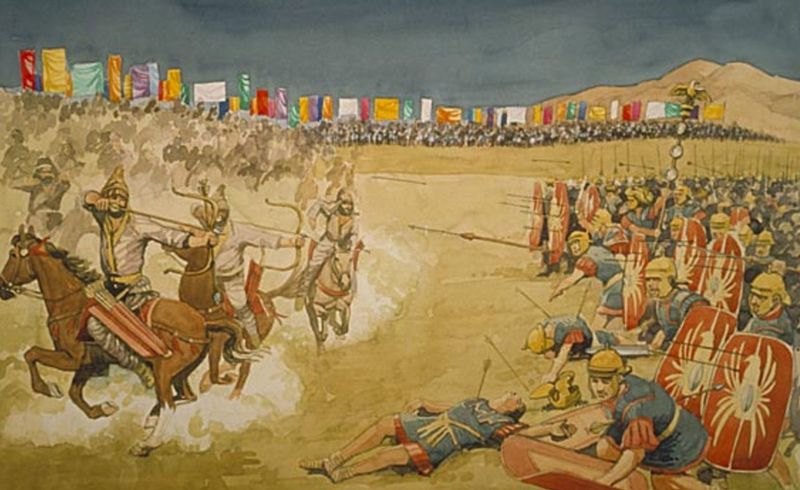History is replete with battles that, though not widely known, have had far-reaching impacts. These confrontations, often overshadowed by more famous conflicts, nonetheless altered the course of history in significant ways.
From ancient clashes to more modern engagements, each battle on this list played a pivotal role in shaping the world as we know it today.
Through strategic victories and consequential defeats, these 20 battles demonstrate the unpredictable nature of warfare and its lasting influence on cultures, nations, and continents.
1. Battle of Carrhae (53 BCE) – Catastrophic Roman defeat by Parthians
The Battle of Carrhae was a significant Roman defeat where General Crassus led his forces into a trap set by the Parthians. The Romans, accustomed to fighting in close formations, were ill-prepared for the Parthian cavalry’s hit-and-run tactics.
This defeat marked a halt to Roman expansion in the East. Crassus’s army suffered heavy losses, with many soldiers captured or killed.
The Parthians’ use of horse archers and cataphracts showcased advanced military strategies that baffled the Romans. This battle highlighted the challenges Rome faced when dealing with Eastern adversaries.
2. Battle of the Teutoburg Forest (9 CE) – Devastating loss that halted Roman expansion into Germania
The Battle of the Teutoburg Forest was a catastrophic defeat for Rome, where three legions were annihilated by Germanic tribes led by Arminius. This ambush halted Roman ambitions of expanding further into Germania.
The dense forest environment contributed to the surprise attack’s success. The loss significantly impacted Roman military strategies and territorial ambitions.
It also instilled a sense of invincibility among the Germanic tribes, altering the power dynamics in the region for generations.
3. Battle of Chalons (451 CE) – Stopped Attila the Hun’s advance in Western Europe
The Battle of Chalons saw Roman and Visigoth forces confronting Attila the Hun in a decisive engagement. This battle was crucial in halting Attila’s advance into Western Europe, preserving the Roman Empire’s western territories.
The battle featured intense cavalry skirmishes and strategic maneuvers. Attila’s defeat marked a turning point in his campaign, showcasing the resilience of Roman and allied forces.
This victory instilled confidence in the Western Roman Empire’s ability to defend its borders against formidable foes.
4. Battle of Roncevaux Pass (778 CE) – Legendary clash that inspired the Song of Roland
The Battle of Roncevaux Pass is famed for inspiring the epic poem, the Song of Roland. Charlemagne’s rearguard, led by Roland, was ambushed by Basque forces in the Pyrenees. This encounter emphasized the challenges of navigating hostile territories.
Despite its scale, the battle left a lasting cultural legacy, highlighting the heroism and tragedy of Roland and his men. It became a symbol of feudal loyalty and chivalry in medieval European literature.
5. Battle of Talas (751 CE) – Pivotal confrontation between Abbasid and Tang forces, leading to crucial technological exchange
At the Battle of Talas, the Abbasid Caliphate clashed with Tang dynasty forces, resulting in a significant Arab victory. This battle halted Chinese expansion into Central Asia and marked the beginning of Islamic influence in the region.
The encounter led to a crucial cultural exchange, including the transfer of papermaking technology to the Islamic world.
This technological diffusion had profound effects on education and administration across the Muslim world, contributing to the Islamic Golden Age.
6. Battle of Chaldiran (1514 CE) – Ottoman victory that shifted the power balance in the Middle East
The Battle of Chaldiran was a decisive clash between the Ottoman Empire and the Safavid dynasty. The Ottomans, led by Sultan Selim I, employed superior artillery and infantry tactics to secure victory.
This battle marked a turning point in Middle Eastern history, establishing Ottoman dominance over the region and curbing Safavid expansion.
The outcome reshaped political and religious dynamics, solidifying Sunni Ottoman control over the predominantly Shia Safavid territories.
7. Battle of Hattin (1187 CE) – Decisive defeat for Crusaders, paving the way for Muslim reconquest of Jerusalem
At the Battle of Hattin, Muslim forces under Saladin inflicted a crushing defeat on the Crusaders, leading to the Muslim reconquest of Jerusalem. The battle took place near the Sea of Galilee, where Crusader forces were surrounded and overwhelmed.
Saladin’s victory showcased his strategic brilliance and unity among Muslim factions. The loss at Hattin had significant repercussions for the Crusader states, marking the decline of Christian presence in the Holy Land.
8. Battle of Ain Jalut (1260 CE) – First major Mongol defeat, altering the course of Middle Eastern history
The Battle of Ain Jalut was a landmark victory for the Mamluks against the Mongol Empire. It was the first significant defeat suffered by the Mongols, who had previously seemed unstoppable.
The Mamluks, led by Sultan Qutuz, utilized superior tactics to outmaneuver the Mongol forces. This victory preserved the Mamluk Sultanate and ensured the survival of Islamic civilization in the Middle East.
It demonstrated that the Mongols could be defeated, inspiring resistance across the region.
9. Battle of Mohi (1241 CE) – Mongol triumph in Hungary that reshaped Central European dynamics
The Battle of Mohi marked a decisive Mongol victory against Hungarian forces. The Mongols, employing superior mobility and coordination, crushed the Hungarian army, leading to widespread devastation across Hungary.
This triumph allowed the Mongols to exert influence over Central Europe, reshaping the region’s power dynamics. The battle highlighted the effectiveness of Mongol military strategies and their ability to conquer diverse territories.
10. Battle of Nicopolis (1396 CE) – Crushing loss for Crusaders, marking the decline of the crusading era
The Battle of Nicopolis was a disastrous defeat for the Crusader armies at the hands of the Ottoman Empire. The poorly coordinated Crusader forces faced Ottoman troops who were well-prepared and strategically adept.
This loss marked the decline of the crusading era, as European forces failed to halt Ottoman expansion into Europe. The battle underscored the importance of unity and strategic planning in military campaigns.
11. Battle of Lipany (1434 CE) – Ended the Hussite Wars and influenced Bohemian religious reform
The Battle of Lipany concluded the Hussite Wars in Bohemia, marking a decisive victory for moderate Hussites over the radical Taborites. This confrontation ended years of religious conflict and paved the way for significant religious reform in Bohemia.
The outcome reinforced moderate religious practices and fostered a period of relative peace in the region. This battle highlighted the ability of diverse factions to reach a compromise for the greater good.
12. Battle of Valmy (1792 CE) – French Revolutionary victory that ignited political transformation in Europe
The Battle of Valmy was a pivotal victory for Revolutionary France against Prussian and Austrian forces. This triumph solidified the French Republic and inspired other revolutionary movements across Europe.
The French forces’ unexpected success boosted morale and demonstrated the effectiveness of citizen armies. It marked a turning point in the European political landscape, leading to widespread changes and the rise of republican ideals.
13. Battle of Friedland (1807 CE) – Led to a treaty that redefined European alliances
The Battle of Friedland was a significant victory for Napoleon Bonaparte’s forces over the Russian Empire. This decisive encounter led to the Treaty of Tilsit, reshaping European alliances and altering the power balance.
Napoleon’s strategic brilliance was evident, as his forces outmaneuvered the Russians, leading to their retreat. The victory solidified Napoleon’s influence in Europe and paved the way for further expansion of the French Empire.
14. Battle of New Orleans (1815 CE) – A surprising American victory that boosted national morale post-War of 1812
The Battle of New Orleans was a defining moment in American history, where General Andrew Jackson led a diverse force to victory against British troops.
This surprise victory occurred after the War of 1812 had officially ended, but before news of the peace treaty had reached the combatants.
The triumph bolstered American pride and nationalism, reinforcing the young nation’s sovereignty and resilience against foreign powers. It is remembered as a symbol of American unity and determination.
15. Battle of Poitiers (1356 CE) – A decisive encounter during the Hundred Years’ War with far-reaching impacts
The Battle of Poitiers was a major English victory over the French during the Hundred Years’ War. English forces, led by the Black Prince, utilized longbowmen to devastating effect against the French knights.
This battle resulted in the capture of the French king, John II, and significantly weakened the French monarchy. The outcome shifted the momentum of the war in favor of England and highlighted the effectiveness of new military tactics.
16. Battle of Saragarhi (1897 CE) – Legendary last stand of Sikh soldiers against overwhelming odds
The Battle of Saragarhi is remembered for the heroic defense by 21 Sikh soldiers of the British Indian Army against overwhelming Pashtun forces. Despite being outnumbered, the Sikhs defended their post with remarkable courage.
Their sacrifice became an enduring symbol of bravery and loyalty, inspiring future generations. The battle highlighted the strategic importance of the Saragarhi outpost and the tenacity of the Sikh soldiers in the face of insurmountable odds.
17. Battle of Adwa (1896 CE) – Ethiopian triumph that secured independence from colonial forces
The Battle of Adwa was a landmark victory for Ethiopia against Italian colonial forces. Led by Emperor Menelik II, Ethiopian troops successfully repelled the Italian invasion, securing Ethiopian sovereignty.
This triumph was a significant moment in African history, highlighting Ethiopia’s resistance against colonialism.
It reinforced Ethiopian independence and inspired other African nations to challenge colonial powers. The battle showcased the strategic acumen and unity of Ethiopian forces.
18. Battle of Omdurman (1898 CE) – Decisive engagement establishing Anglo-Egyptian dominance in Sudan
The Battle of Omdurman was a decisive victory for British and Egyptian forces over the Mahdist Sudanese. Led by General Kitchener, the well-equipped Anglo-Egyptian army utilized advanced weaponry, including machine guns, to crush the Mahdist resistance.
This engagement solidified British dominance in Sudan and demonstrated the technological superiority of colonial powers. It marked a turning point in the colonization of Africa, with significant geopolitical implications.
19. Battle of Manila Bay (1898 CE) – Naval victory that signaled the rise of American imperial power
The Battle of Manila Bay was a decisive naval engagement during the Spanish-American War. The American fleet, led by Commodore Dewey, destroyed the Spanish Pacific Squadron, signaling the rise of American imperial power.
This victory enabled the United States to exert control over the Philippines, marking a significant expansion of American influence in the Pacific.
The battle underscored the importance of naval power in modern warfare and set the stage for the U.S.’s emergence as a global power.
20. Battle of Tannenberg (1914 CE) – A crucial World War I clash that reshaped the Eastern Front
The Battle of Tannenberg was a major German victory against Russian forces in the early days of World War I. The German army, under the command of Generals Hindenburg and Ludendorff, encircled and decimated the invading Russian Second Army.
This victory had significant strategic implications, reshaping the Eastern Front and boosting German morale. It demonstrated the effectiveness of rapid maneuver warfare and set the stage for subsequent German advances in the east.




















